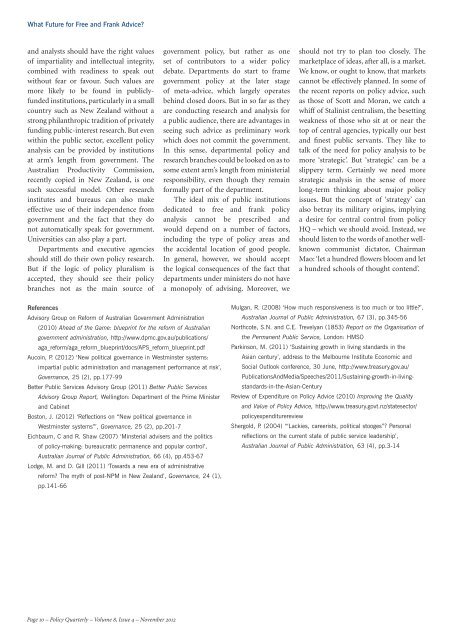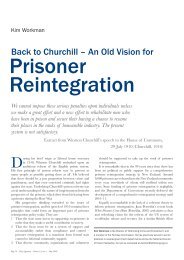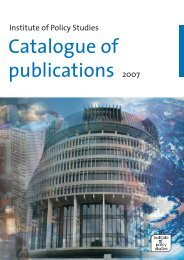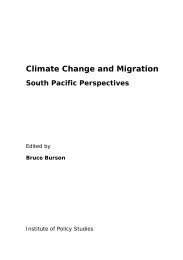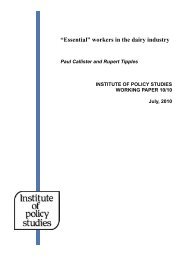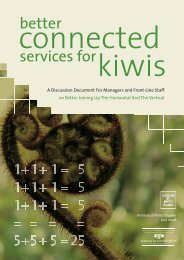PDF File - Institute for Governance and Policy Studies - Victoria ...
PDF File - Institute for Governance and Policy Studies - Victoria ...
PDF File - Institute for Governance and Policy Studies - Victoria ...
Create successful ePaper yourself
Turn your PDF publications into a flip-book with our unique Google optimized e-Paper software.
What Future <strong>for</strong> Free <strong>and</strong> Frank Advice<br />
<strong>and</strong> analysts should have the right values<br />
of impartiality <strong>and</strong> intellectual integrity,<br />
combined with readiness to speak out<br />
without fear or favour. Such values are<br />
more likely to be found in publiclyfunded<br />
institutions, particularly in a small<br />
country such as New Zeal<strong>and</strong> without a<br />
strong philanthropic tradition of privately<br />
funding public-interest research. But even<br />
within the public sector, excellent policy<br />
analysis can be provided by institutions<br />
at arm’s length from government. The<br />
Australian Productivity Commission,<br />
recently copied in New Zeal<strong>and</strong>, is one<br />
such successful model. Other research<br />
institutes <strong>and</strong> bureaus can also make<br />
effective use of their independence from<br />
government <strong>and</strong> the fact that they do<br />
not automatically speak <strong>for</strong> government.<br />
Universities can also play a part.<br />
Departments <strong>and</strong> executive agencies<br />
should still do their own policy research.<br />
But if the logic of policy pluralism is<br />
accepted, they should see their policy<br />
branches not as the main source of<br />
government policy, but rather as one<br />
set of contributors to a wider policy<br />
debate. Departments do start to frame<br />
government policy at the later stage<br />
of meta-advice, which largely operates<br />
behind closed doors. But in so far as they<br />
are conducting research <strong>and</strong> analysis <strong>for</strong><br />
a public audience, there are advantages in<br />
seeing such advice as preliminary work<br />
which does not commit the government.<br />
In this sense, departmental policy <strong>and</strong><br />
research branches could be looked on as to<br />
some extent arm’s length from ministerial<br />
responsibility, even though they remain<br />
<strong>for</strong>mally part of the department.<br />
The ideal mix of public institutions<br />
dedicated to free <strong>and</strong> frank policy<br />
analysis cannot be prescribed <strong>and</strong><br />
would depend on a number of factors,<br />
including the type of policy areas <strong>and</strong><br />
the accidental location of good people.<br />
In general, however, we should accept<br />
the logical consequences of the fact that<br />
departments under ministers do not have<br />
a monopoly of advising. Moreover, we<br />
should not try to plan too closely. The<br />
marketplace of ideas, after all, is a market.<br />
We know, or ought to know, that markets<br />
cannot be effectively planned. In some of<br />
the recent reports on policy advice, such<br />
as those of Scott <strong>and</strong> Moran, we catch a<br />
whiff of Stalinist centralism, the besetting<br />
weakness of those who sit at or near the<br />
top of central agencies, typically our best<br />
<strong>and</strong> finest public servants. They like to<br />
talk of the need <strong>for</strong> policy analysis to be<br />
more ‘strategic’. But ‘strategic’ can be a<br />
slippery term. Certainly we need more<br />
strategic analysis in the sense of more<br />
long-term thinking about major policy<br />
issues. But the concept of ‘strategy’ can<br />
also betray its military origins, implying<br />
a desire <strong>for</strong> central control from policy<br />
HQ – which we should avoid. Instead, we<br />
should listen to the words of another wellknown<br />
communist dictator, Chairman<br />
Mao: ‘let a hundred flowers bloom <strong>and</strong> let<br />
a hundred schools of thought contend’.<br />
References<br />
Advisory Group on Re<strong>for</strong>m of Australian Government Administration<br />
(2010) Ahead of the Game: blueprint <strong>for</strong> the re<strong>for</strong>m of Australian<br />
government administration, http://www.dpmc.gov.au/publications/<br />
aga_re<strong>for</strong>m/aga_re<strong>for</strong>m_blueprint/docs/APS_re<strong>for</strong>m_blueprint.pdf<br />
Aucoin, P. (2012) ‘New political governance in Westminster systems:<br />
impartial public administration <strong>and</strong> management per<strong>for</strong>mance at risk’,<br />
<strong>Governance</strong>, 25 (2), pp.177-99<br />
Better Public Services Advisory Group (2011) Better Public Services<br />
Advisory Group Report, Wellington: Department of the Prime Minister<br />
<strong>and</strong> Cabinet<br />
Boston, J. (2012) ‘Reflections on “New political governance in<br />
Westminster systems”’, <strong>Governance</strong>, 25 (2), pp.201-7<br />
Eichbaum, C <strong>and</strong> R. Shaw (2007) ‘Minsterial advisers <strong>and</strong> the politics<br />
of policy-making: bureaucratic permanence <strong>and</strong> popular control’,<br />
Australian Journal of Public Administration, 66 (4), pp.453-67<br />
Lodge, M. <strong>and</strong> D. Gill (2011) ‘Towards a new era of administrative<br />
re<strong>for</strong>m The myth of post-NPM in New Zeal<strong>and</strong>’, <strong>Governance</strong>, 24 (1),<br />
pp.141-66<br />
Mulgan, R. (2008) ‘How much responsiveness is too much or too little’,<br />
Australian Journal of Public Administration, 67 (3), pp.345-56<br />
Northcote, S.N. <strong>and</strong> C.E. Trevelyan (1853) Report on the Organisation of<br />
the Permanent Public Service, London: HMSO<br />
Parkinson, M. (2011) ‘Sustaining growth in living st<strong>and</strong>ards in the<br />
Asian century’, address to the Melbourne <strong>Institute</strong> Economic <strong>and</strong><br />
Social Outlook conference, 30 June, http://www.treasury.gov.au/<br />
PublicationsAndMedia/Speeches/2011/Sustaining-growth-in-livingst<strong>and</strong>ards-in-the-Asian-Century<br />
Review of Expenditure on <strong>Policy</strong> Advice (2010) Improving the Quality<br />
<strong>and</strong> Value of <strong>Policy</strong> Advice, http://www.treasury.govt.nz/statesector/<br />
policyexpenditurereview<br />
Shergold, P. (2004) ‘“Lackies, careerists, political stooges” Personal<br />
reflections on the current state of public service leadership’,<br />
Australian Journal of Public Administration, 63 (4), pp.3-14<br />
Page 10 – <strong>Policy</strong> Quarterly – Volume 8, Issue 4 – November 2012


